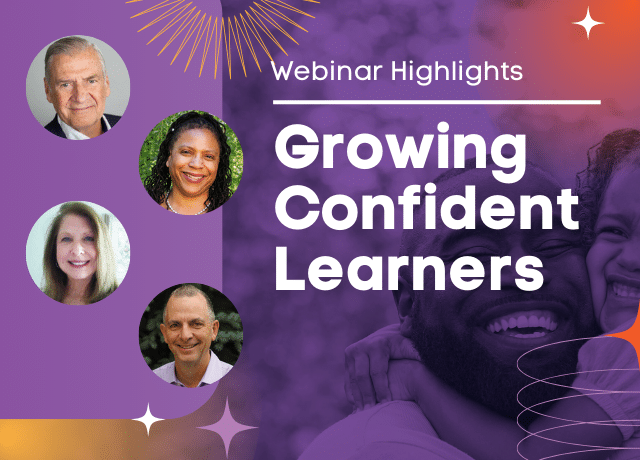What happens when a child hears “You can do it!” for the first time? How do daily conversations shape a child’s view of themselves? In our recent webinar, “Growing Confident Learners,” experts explored these questions and more about the critical role of self-confidence in early childhood education and early literacy.
Our panel brought together three unique perspectives: Dr. Kyle Pruett, clinical professor at Yale School of Medicine; Dr. Barbara Stroud, a psychologist with over 30 years of experience; and Eva Jenkins, an award-winning preschool teacher from Tennessee.
“The first 1,000 days last forever,” shared Dr. Pruett during our discussion. Meaning those early childhood experiences matter for the rest of a child’s life.
We know that children who have more back-and-forth conversations with adults show increased self-confidence, independence, and persistence. And when early childhood educators focus on positive interactions, children start initiating more interactions themselves.
Throughout the webinar, our experts tackled big questions: What exactly is self-regard? How do our relationships with children shape their view of themselves? And what can we do each day to help build confident learners?
Self-Regard vs. Self-Esteem: Shaping a Child’s Inner Strength
Words affect how we view children’s confidence. Dr. Pruett shared an idea that might change how you understand child development.
Instead of “self-esteem,” Dr. Pruett prefers the term “self-regard.” This subtle but important difference places children at the center of their own experience. Self-regard grows from inside children as they learn about their place in the world. Self-esteem comes from external sources. It’s placed on them.
“Self-regard is embedded in how caregivers and other adults hold, talk to, and respond to babies and children,” said Dr. Pruett.
Most children develop true confidence around age five, but the foundation starts much earlier. The first thousand days of life create lasting patterns in how children see themselves. This makes every early interaction powerful.
In other words, children are active participants in building their own identity, not just passive receivers of our praise.
Today’s Challenges for Children’s Self-Regard
Children today face new hurdles in building a strong sense of self. Our experts shared what worries them most about how kids develop confidence.
For one, COVID changed how families talk and connect with each other. Many parents now make choices based on fear rather than hope. But babies are fountains of hope! And fear is toxic to their development of self-regard.
Additionally, as Eva Jenkins pointed out, “The shift from academic readiness to emotional readiness is a step in the right direction. Executive functioning skills like self-care and self-control are crucial for a successful life.” This change sounds good. But nearly half of kids still start school without these important skills.
Screens and busy schedules also make it harder for families to truly connect. Children often miss out on vital interactions that come from responsive relationships with adults.
These challenges show why we need to pay special attention to building strong relationships with children. When adults take time to validate children’s experiences and help them understand their emotions, they help build the foundation for positive self-regard.
How Relationships Build Strong Brains and Confident Learners
The panelists explained why responsive relationships create the base for healthy development.
Dr. Stroud believes wholeheartedly in the simple act of slowing down. When adults take time to really notice a child’s experience, they send a clear message: You matter. Feeling seen and valued builds the core of confidence in young children.
“When adults can slow down and be in relationships that offer acceptance and connection, … I think that helps us get to the place of self-regard,” Dr. Stroud explained. “When a baby is crying, they’re seeking connection and support. Are we responsive in caregiving? Do kids have permission to be who they are? These are so important in the first thousand days. Self-regard can be seen as self-understanding. How are others receiving me and do I feel connected to community?”
Early relationships create a bridge that connects emotional, social, and thinking skills. Children who believe they can make things happen and that adults will respond are more likely to stay engaged when tasks become challenging.
LENA Grow: Transforming Classrooms Through Conversation
When Eva Jenkins started using LENA Grow in her classroom, she didn’t expect it would change everything about how she teaches. As an award-winning educator with over 40 years of experience, she had tried many approaches. But none had the impact of focusing on conversational turns.
“Who would have thought something as simple as a conversation can lead to competency and self-awareness, and transform a child? But it has, and it does.”
These changes sparked amazing growth. After just two weeks, conversational turns doubled. Children began asking more questions, solving problems, and showing respect for others’ ideas. Children who were less verbal developed stronger language skills, while highly verbal children became confident role models for their peers.
Teachers benefited too. The immediate coaching they received helped them feel successful and empowered. They set higher goals and felt renewed pride in their work — a crucial outcome in a field facing serious retention challenges.
Building Confident Learners: Every Interaction Counts
Our panel found several reasons for hope despite today’s challenges. Eva shared that policy makers now listen more to early childhood advocates. Dr. Stroud sees growing understanding about children’s emotional health. And Dr. Pruett expressed confidence in early childhood educators who increasingly recognize the importance of those first 1,000 days in shaping lifelong development.
As Eva said, “Good attachments lead to positive results later in life. This can happen anywhere there’s a language-based environment.”
LENA’s research also confirms that these daily interactions truly matter. Conversational turns build the foundation for confident learners who see themselves as capable, valued, and ready to explore the world!
Want to watch the full replay of this webinar? Stream it here!








